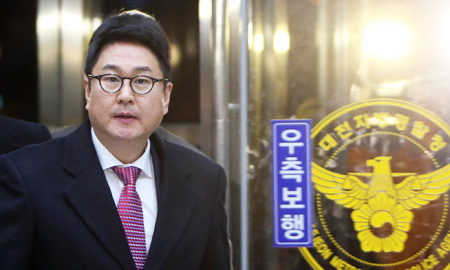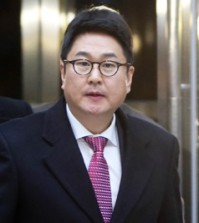- California Assembly OKs highest minimum wage in nation
- S. Korea unveils first graphic cigarette warnings
- US joins with South Korea, Japan in bid to deter North Korea
- LPGA golfer Chun In-gee finally back in action
- S. Korea won’t be top seed in final World Cup qualification round
- US men’s soccer misses 2nd straight Olympics
- US back on track in qualifying with 4-0 win over Guatemala
- High-intensity workout injuries spawn cottage industry
- CDC expands range of Zika mosquitoes into parts of Northeast
- Who knew? ‘The Walking Dead’ is helping families connect
Probe on Daum Kakao CEO causes overregulation controversy

Daum Kakao CEO Lee Sir-goo enters the Daejeon Metropolitan Police Agency office Wednesday to be questioned over allegations the company has been negligent in detecting child pornography on its social networking service. (Yonhap)
By Yoon Sung-won
The questioning of Daum Kakao CEO Lee Sir-goo by police Wednesday has triggered a dispute over excessive regulation of domestic online service providers.
The Daejeon Metropolitan Police Agency said that it summoned Lee, the head of the nation’s leading mobile messenger operator, to question over allegations that the company’s was negligent in failing to block child pornography from being shared on Kakao Group, a mobile app designed for messaging among groups of people. This was the first time for the head of a local online service provider to be investigated for potentially violating the Juvenile Sex Protection Law in Korea.
The local Internet service industry expressed concern that the service providers have limitations in monitoring the users’ private conversations on social networking services under the current law which lacks a clear statement on the firms’ technological response in such cases.
“The mobile service involved in this case is a closed-type community service and the company cannot look through undisclosed posts,” an industry source said.
The current law stipulates that online service providers must have appropriate measures in place to detect child pornography. Those who violate the law are subject to a jail term of up to three years and a fine of up to 20 million won.
“The service operator may block certain articles that include obscene keywords and expressions. But establishing a system that preemptively blocks such content requires a data base on child pornography, which is like the one operated by Interpol,” the source said. “The current law, however, also says that owning child pornography itself is illegal and this prohibits the police to have such a system. The law lacks deliberation on such technological loopholes.”
Daum Kakao said it deletes obscene content uploaded on Kakao Group as soon as it is discovered or reported and permanently bans those who have posted such content.
Choi Sung-jin, an executive at the industry lobby K-internet, said, “The Juvenile Sex Protection Law has faced opposition from the industry as it lacks clear statements on technological responses a service provider can conduct. Unfair enforcement of the law may cause negative repercussions to the entire local Internet service industry.”
The recent police action also reignited controversy about reverse discrimination against domestic online service providers.
While Daum Kakao faces a police investigation over the preemptive detection on child pornography, foreign-based social network services such as Twitter are left untouched as the service has no policy to block the use of obscene words.
“It is not right that the police summoned a CEO of a local online service provider to open an investigation based on a stubborn legal standard while punishing only those who have caused visible problems regarding foreign companies,” another industry insider said.
















